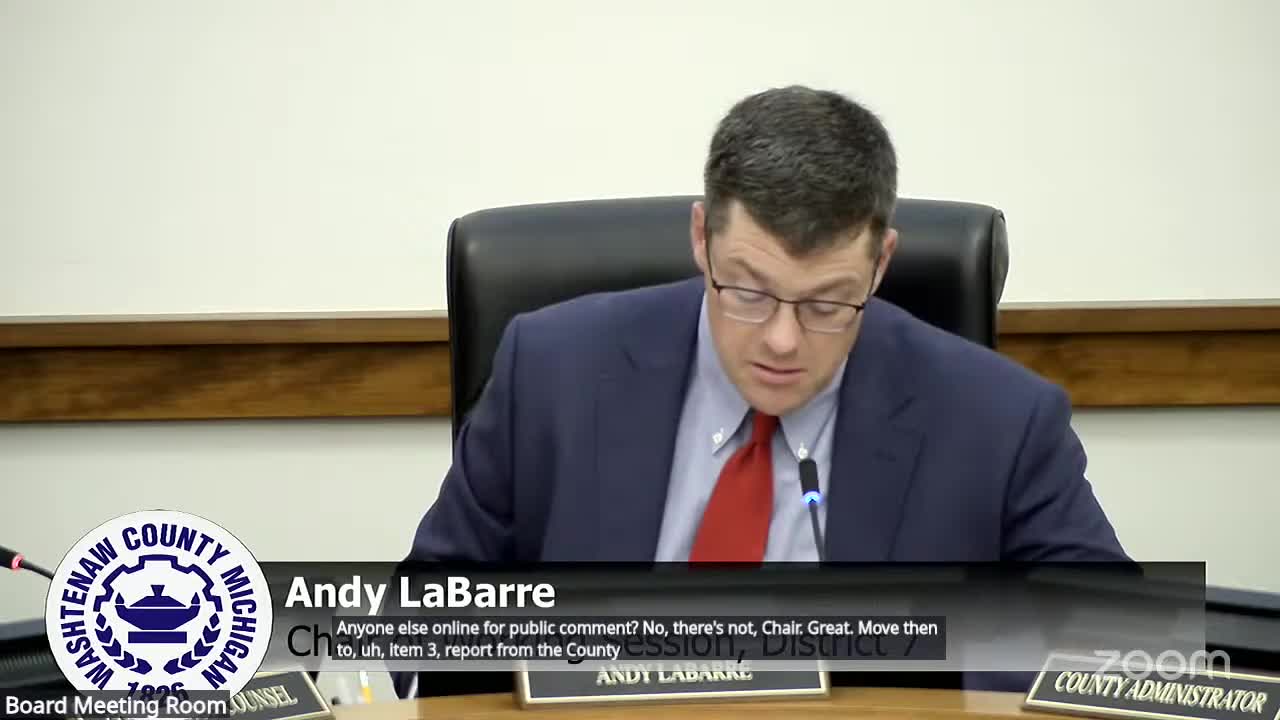Washtenaw County racial equity office updates board on youth assessment and resource center plans
Get AI-powered insights, summaries, and transcripts
Subscribe
Summary
At a Washtenaw County Board working session on Oct. 15, 2025, Washtenaw County Racial Equity Officer Derek Jackson updated commissioners on a planned Youth Assessment and Resource Center intended to connect at‑risk youth and families to community services and prevent deeper involvement with the juvenile justice system.
At a Washtenaw County Board working session on Oct. 15, 2025, Washtenaw County Racial Equity Officer Derek Jackson updated commissioners on a planned Youth Assessment and Resource Center intended to connect at‑risk youth and families to community services and prevent deeper involvement with the juvenile justice system.
Jackson said the center is “connecting youth to community, not systems,” and described the proposal as a front‑door, early‑intervention hub that emphasizes restoration and diversion rather than punishment.
Why it matters: county presenters said local data show stark disparities and system gaps the center aims to address. Jackson said roughly 70% of children involved in the juvenile justice system in Washtenaw County are Black, while Black youth make up a much smaller share of the 10–17 population. He and other presenters also cited handle‑with‑care notices and chronic absenteeism as signals that early help is needed: staff said 3,800 children received at least one Handle With Care notice between February 2018 and April 2025, and that roughly 31% of the county’s 42,544 students are chronically absent (about 13,000 students), missing an average of about 42 days of school.
What the model would do: Jackson said the proposal is a three‑year proof of concept housed in the Racial Equity Office and described as a hub of community partners rather than a single clinical building. The center would accept referrals from parents, schools, police and others; perform assessments; and arrange partial reimbursements to community providers for services. Jackson stressed the center would not be run by a single service provider and said the plan aims to create upstream pathways so families can access supports before court or detention involvement.
Funding and next steps: Jackson said the county previously allocated $100,000 for planning and technical assistance and that Community Mental Health (CMH) has funded the National Association of Assessment Centers to provide technical help. He described a braided funding approach that could include child‑care fund reimbursements, public‑safety and mental‑health dollars, philanthropy and partial payments to nonprofits, but said final service details and revenue sources remain to be developed. “We’re only asking for a three‑year proof of concept,” Jackson said; he told the board the immediate next step would be to seek funding for a program manager to implement the design. He also made clear the presentation was an update: commissioners were told there was no formal ask on the floor that night.
Reaction and requests from officials: Commissioners pressed for more youth voice in planning and for clearer partnerships with existing youth providers. Commissioner Rabe urged including the county’s youth commission and local organizations such as Ozone House and Neutral Zone in planning; Jackson said multiple youth listening sessions had already informed the design and that youth had asked for a community‑centered, nonclinical hub.
County Prosecutor Savitt, who joined remotely, said early help is critical. “Why do we have to wait for our kid to run afoul of the law or get into trouble to get them help?” he asked, arguing the assessment center model can offer resources without imposing the trauma of court involvement. Administrator Dill and CMH representatives were also cited during the discussion as ongoing partners in mapping services and funding opportunities.
Outstanding questions and implementation risk: presenters and commissioners emphasized the need to map existing provider capacity; Jackson acknowledged gaps in noncrisis, longer‑term services and said the center would identify and help build missing services. The plan’s success depends in part on new state guidance allowing child‑care fund prevention dollars to be used for upstream services and possible Medicaid reimbursement for preventive services; presenters characterized implementation risk as medium and said they will return with a detailed funding request in the coming budget process.
What comes next: staff said they will bring a funding request for a program manager and further implementation details to the full board as part of upcoming budget deliberations. Commissioners asked for continued community and youth participation as the framework is finalized.
Speakers quoted or referenced in this article are listed in the attached speaker list below.
